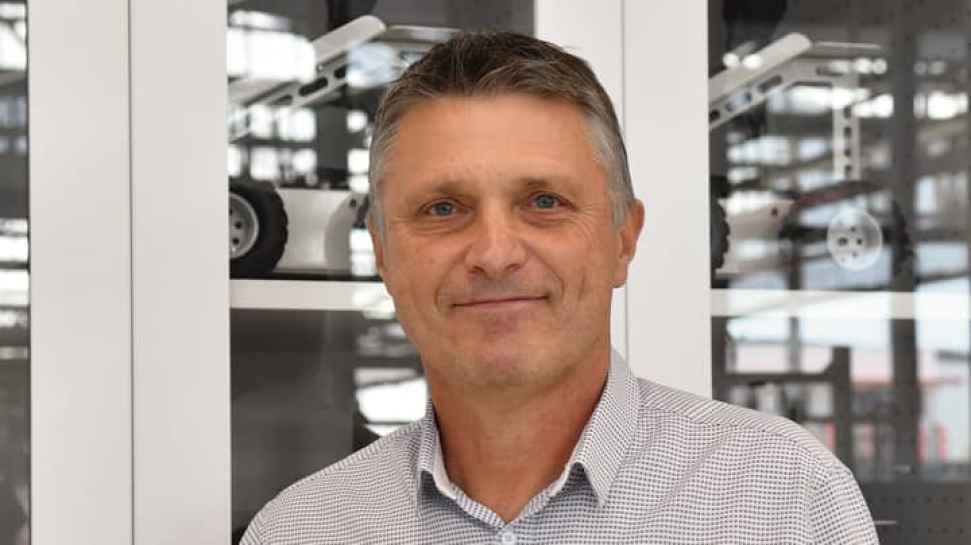Melissa Lyne
FUTURE MAKERS
—
Flinders is shoring up Australia’s future by helping businesses adopt next-generation manufacturing. Welcome to Industry 4.0: the fourth industrial revolution.
Former president of Mitsubishi Motors Australia Robert McEniry had just one wish for the company’s vacated plant at Tonsley. He wanted this manufacturing legacy to once again benefit Adelaide.
In 2015, this vision became a reality when Flinders University moved into its new, $120 million Tonsley campus, alongside a number of other teaching, government, industry, startup, and entrepreneurial bodies.
Operations at the former Mitsubishi site now empower businesses to adopt the next generation of manufacturing – known as Industry 4.0 – for future economic and employment gains.
And, as the business of making stuff continues to rapidly evolve, “no industry will be left untouched,” says Pro-Vice Chancellor of Research Impact Professor John Spoehr a leading economic and industry analyst.
The Flinders at Tonsley campus is home to the Australian Industrial Transformation Institute (AITI) and the Tonsley Manufacturing Innovation (TMI) Hub, which are helping South Australia gain a competitive edge over other regions. Global companies such as Siemens, Tesla and Zeiss, also have operations within the precinct.
“Manufacturing is still fundamentally the most important of the economic sectors,” says Dr Mark Dean, a research associate at AITI. “We take it for granted, but everything in the built environment is manufactured.”
This means that in order to remain competitive, all manufacturing is under intense pressure to transform using advanced technologies says Professor Spoehr, who led the establishment of the TMI Hub in his other role as the Director of AITI.
The technologies being developed and tested at AITI include robotics, automation, artificial intelligence (AI), nanotechnology, photonics and sensing. The Internet of Things, which creates a network between devices that can ‘talk’ to one another, is also a focus.

John Spoehr is Pro-Vice Chancellor - Research Impact at Flinders University. He is also Director of the Australian Industrial Transformation Institute. John leads a multi-discplinary team focusing on industry and workplace transformation in the context of technological change and innovation.
Rather than displacing jobs, these technologies increased productivity and quality.
The robot revolution
In early 2018, the TMI Hub launched with the task of investigating an array of advanced technologies.
As companies change the way they make things, being able to test new processes is essential to reducing the risks and costs. The hub’s virtual environment setup allows manufacturers to design and test new production processes and technologies well before implementation.
Professor Spoehr explains that implementing new technologies isn’t about replacing jobs. Instead, it can introduce a wide range of new manufacturing tasks, while also reducing the risk of physical harm to humans.
“Routine and repetitive tasks are clearly at risk of loss from automation,” he says. “But the goal should be to provide more rewarding, highly-skilled, and better paid employment for those impacted. We need to ensure that they share the benefits of Industry 4.0, rather than cut jobs as some companies are doing, which is not sustainable.”
With his work stationed in the former Mitsubishi manufacturing plant, Dr Dean says it’s inspired him to reflect on the site’s industrial past to inform his vision for the future. When in operation, Mitsubishi introduced robots and computer-aided design and manufacturing.
Rather than displacing jobs, these technologies increased productivity and quality.
“We need to use the past as a foundation,” he says. “The optimal outcome is to create a future of work that’s safe for humans. Businesses can remain innovative by focusing not on how much is manufactured, but on how clever production can be.”
Looking to the future
It’s no coincidence that some of the world’s most developed economies have been built on the back of manufacturing. The progression of society, says Dr Dean, is driven by manufacturing.
“Other nations have used policy to develop innovative business models and work practices that encourage new forms of production and employment that are aided by technology, not necessarily determined by technology,” he explains. “In these nations, robots aren’t simply taking jobs, they’re changing jobs.”
The challenge now is for Australia to significantly scale up the suite of measures already in place and adopt new ones that are capable of achieving change.
Professor Spoehr compares this to what’s happening around the world, such as in the UK and other parts of Europe. There, industrial transformation is a high priority and is backed by significant government investment in education and training, research and development, and new facilities.
“This is less about getting technology to businesses, and instead tying it to an overall industrial strategy,” says Dr Dean. “This is a place where innovation is able to grow these industries. The companies here compete indirectly but collaborate directly.”
As Australia prepares to undergo more challenges in manufacturing in the next 20 years than it has in the past 100, our greatest minds must team up like never before to find new solutions in areas such as medical technology, digital health, renewable energy, and sustainable manufacturing.
As Professor Spoehr says, “Here at Tonsley, we are creating the foundation for the country to accelerate the growth of manufacturing businesses, as well as rewarding jobs.”
Donate to research
Through research, and research-led teaching, we build and develop the knowledge and capabilities that improve lives and enhance society as a whole. Your gift can help support our projects, which are finding practical solutions to real-world challenges and create hope for a better future.
![]()
Sturt Rd, Bedford Park
South Australia 5042
South Australia | Northern Territory
Global | Online






